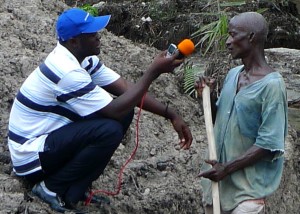Top 5 mistakes recording audio
 Many journalists don’t record audio as well as they should. Be it in radio or video production, recording good sound can make or break your story.
Many journalists don’t record audio as well as they should. Be it in radio or video production, recording good sound can make or break your story.
Below you can hear examples of some of the most common mistakes journalists make when recording audio. Once you’ve heard how these mistakes sound on tape, it should be easier to avoid them yourself.
![]() read more
read more
Tools and Apps for Journalists: Listly
![]()
List.ly makes lists with a twist. It’s a web tool that lets you make collaborative lists. Think of them as interactive or living lists. A list generated in Listly doesn’t stay rigid or static. Users can not only view and share the list, but they can also add to it and give the list a ranking.
Listly recently integrated Twitter lists to its service. That’s what caught our eye. A public Twitter list remains useful when new sources are added and redundant ones “pruned”. Potentially, Listly could help make Twitter lists not only more useful in newsrooms but also offer a form of social media content that could attract a larger audience.
![]() read more
read more
Quick tips on searching for Twitter lists
 Twitter lists are an essential social media research tool for journalists. If you’re working a particular beat and need to follow updates from people on a certain topic, creating your own Twitter list or subscribing to the public list curated by someone else can save a lot of valusble time.
Twitter lists are an essential social media research tool for journalists. If you’re working a particular beat and need to follow updates from people on a certain topic, creating your own Twitter list or subscribing to the public list curated by someone else can save a lot of valusble time.
But how do you go about searching for good Twitter lists or refining your search for specific information within a Twitter list?
Here are a few quick search tips to try.
![]() read more
read more
Coding for journalists: 10 hottest websites to teach yourself to code

Photo – Fotolia/spaxiax
Should journalists learn computer code? That’s a controversial question at the moment. The general consensus seems to be that today’s journalists need at least a basic level of technical literacy so when they team up with developers, they can better understand the language they speak. To get journalists up to speed, onMedia has prepared an overview of the best websites to help learn how to write code without having to turn into a hard-core programmer.
![]() read more
read more
Taking your radio features to the next level (part 2)

Photo: flickr/France1978
In the second part of our post on giving your radio features that extra little something, radio producer and trainer Kyle James talks about putting your listeners right in the scene and getting creative with voice clips. Remember, the goal is to break out of those ruts that we all can fall into.
![]() read more
read more
Tools & Apps for Journalists: If This Then That

If This Then That (commonly known as IFTTT, pronounced ‘ift’, like the word ‘gift’) is a neat little online tool that can magically simplify your online activities by automating tasks. It’s based on the idea of “if this happens, then do that”. When I publish this post on WordPress (the ‘if this’ part), I can use IFTTT to automatically post the link to my Facebook account (the ‘then that’ part). Or else, every time I like a track on SoundCloud, I can get IFTTT to download it automatically to my Dropbox.
IFTTT supports a whole bunch of online applications (including all the major ones). The tool works by simple rules so that each specific event triggers a specific action. IFTTT calls these rules ‘recipes’. Once you have granted IFTTT access to the apps you use, you can create your own individual recipes.
IFTTT walks you through the process step by step and it’s really easy to use.
![]() read more
read more







